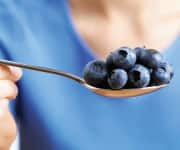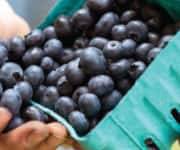Life Extension Magazine®
Blueberries contain potent polyphenols that provide a wide array of health benefits.1
Ingestion of blueberry polyphenols may decrease the risk for cognitive decline,2,3 cancer,4,5 and heart disease.6,7
Researchers are discovering a stronger connection between blueberries and heart health than had previously been known.
They are finding that blueberries help protect against arterial blockage and improve peripheral arterial function.
Blueberry polyphenols including anthocyanins and anthocyanidins, may function as inhibitors of some underlying causes of heart disease.
Preventing Foam Cell Formation Protects the Artery Walls
The majority of heart disease is caused by atherosclerosis, which is the buildup of fatty deposits (plaque) that narrow the artery walls.7,8
A critical step in the development of atherosclerosis is the adhesion of monocytes (a type of white blood cell) to the endothelial cells that line the artery walls.9,10
These monocytes enter the blood vessel lining and develop into macrophages which have the job of engulfing oxidized LDL cholesterol. Accumulation of oxidized LDL particles in the macrophage leads to the formation of foam cells.9,10
The accumulation of foam cells, along with the proliferation of smooth muscle cells and excess connective tissue, are key drivers of atherosclerosis.9,10
The process by which atherosclerosis causes a heart attack is complex. Foam cells play a central role in the inflammation that drives this process.11
Several studies have demonstrated that blueberry consumption can interfere with the adhesion of monocytes to endothelial cells and reduce the formation of these foam cells. What this means is that blueberries may play a role in reducing the formation of atherosclerosis.
In one study, a group of researchers tested mice that were genetically prone to develop atherosclerosis and fed them a diet with or without the addition of blueberries. After 20 weeks, blueberry supplementation attenuated foam cell formation, compared to the control group. Researchers observed that in supplemented mice, the expression of receptors associated with the development of foam cells and vascular lesion formation was inhibited.12
Blueberries Reduce Metabolic Syndrome
In a more recent study, researchers evaluated the effects of blueberry consumption on indicators of oxidative stress and inflammation in patients with metabolic syndrome.13
Metabolic syndrome is a cluster of conditions that includes some combination of high blood pressure, abdominal obesity, high blood sugar, and abnormal lipid profiles. Metabolic syndrome is associated with a highly pro-inflammatory environment in the body, and a sharp increase of risk for heart disease, stroke, and diabetes.14,15
For the study, one group of patients received a smoothie containing 22.5 grams of freeze-dried blueberries (approximately two cups of fresh blueberries). The other group received a placebo smoothie twice daily.
After six weeks, blueberry supplementation markedly decreased superoxide and total reactive oxygen species in whole blood and monocytes compared to placebo. Supplemented patients also had a reduced expression of inflammatory markers in the monocytes.
The researchers noted that to their knowledge, this was the first study to yield significant improvements in oxidative and inflammatory parameters in patients with metabolic syndrome after just six weeks of blueberry consumption.

Not Everyone Can Afford Blueberries
Fresh blueberries in stores can be expensive. This is in part due to the high rate of spoilage if they are not sold and eaten quickly, as well as the price of shipping the fruit.
Studies presented in this article show that consumption of about two cups of blueberries daily is protective, an amount that is more easily and affordably achieved with just two blueberry extract capsules per day.
Blueberries Enhance Statin Benefits
Recent data have shown that one of the ways statins (cholesterol-lowering drugs) benefit the cardiovascular system is by reducing oxidative stress.16-18
A group of researchers hypothesized that adding blueberry polyphenols to a low-dose statin would enhance its benefits.19
To test their hypothesis, they fed a group of rats a high-fat diet to induce hypercholesterolemia. A total of six groups of six rats each were assigned to receive a statin or blueberry extract alone (high and low dose), a combination of a statin with a high- and a low-dose blueberry extract, and a control.19
After 14 days, the researchers tested the rats’ weight and several biomarkers for cardiovascular disease risk: LDL and HDL cholesterol, total cholesterol, triglycerides, creatine kinase, homocysteine, and multiple markers for oxidative and DNA damage.
This study showed that blueberry extract supplementation protected against weight gain, improved lipid profiles, and reduced oxidative stress in hypercholesterolemic rats. The high-dose blueberry extract, in combination with a statin, was more effective than the blueberry extract alone.
Approximately a quarter of the U.S. adult population is taking a statin.20 Statin drugs significantly reduce LDL cholesterol levels. But taken alone, it is not the optimal approach to promote a healthy heart. A multifaceted approach should be taken to safely reduce all the risk factors of heart disease.
Beneficial Gene Expression
In a cell culture study, researchers dove deep into the molecular properties behind the mechanisms that drive the benefits of blueberries.21
To determine the physiologically relevant concentrations of blueberry-derived polyphenol compounds, the researchers recruited three healthy individuals and measured their blood for polyphenol metabolites following a single intake of blueberry juice.
This allowed researchers to identify a polyphenol mixture to be tested in endothelial cells for their ability to induce nuclear factor erythroid 2-related factor 2 (Nrf2). Nrf2 is a key factor in inducing the activity of genes that regulate the body’s defenses against oxidative stress.
What the researchers discovered is that blueberries and other polyphenol metabolites are bioactive, and significantly up-regulate the beneficial Nrf2 pathway. This finding further explains the systemic benefits blueberries have shown in previous studies.
The Nrf2 pathway has received a lot of attention from researchers, including for development of drugs that upregulate Nrf2 signaling as a therapeutic approach against several chronic diseases.22

WHAT YOU NEED TO KNOW
Blueberry Benefits
- Blueberries contain high amounts of polyphenols which offer a wide array of health benefits.
- Ingestion of blueberry polyphenols may decrease the risk for cognitive decline, cancer, and heart disease.
- Polyphenols in blueberries, including anthocyanins and anthocyanidins, may function as inhibitors of some underlying causes of heart disease.
- Blueberries may play a role in reducing the formation of atherosclerosis.
- Consumption of about two cups of blueberries daily is protective, an amount that is more easily and affordably achieved with just two blueberry extract capsules per day.
Blueberries Ameliorate Cardiovascular Damage from Smoking
A team of researchers investigated whether blueberry polyphenols can reduce oxidative stress and inflammation and promote healthy nitric-oxide-mediated endothelial function in smokers. Because cigarette smoking has the opposite effects—promoting oxidative stress and inflammation, and inducing endothelial dysfunction, this created a strong experimental challenge for blueberries’ cardiovascular health benefits.
Specifically, the trial measured the effect of a single serving of 300 grams (two cups) of blueberries on blood pressure, heart rate, and peripheral arterial function.23
Sixteen male cigarette smokers were separated into three groups based on the experimental conditions (smoking one cigarette, smoking plus ingesting 300 grams of blueberry, or drinking a 300 mL sugar-containing control beverage). All patients rotated among the treatments with a one-week wash-out period in between.
Blueberry treatment significantly counteracted the temporary impairment of peripheral arterial function and the rise in systolic blood pressure caused by acute exposure to cigarette smoke.
What these results indicate is that even with the profound health consequences from smoking, blueberries can still shield against some of the cardiovascular damage. Of course, the most important thing smokers can do for their health is to quit smoking. Unfortunately, that is easier said than done. So, the ability of blueberries to partially protect against this damage is truly welcome.
Summary
Research shows that blueberry consumption and supplementation can shield against multiple risk factors for heart disease.
Noteworthy is that blueberries favorably affect a key factor in the development of atherosclerosis by impeding the formation of foam cells.
This new research suggests that those who are at an elevated risk for heart disease should seek to increase their blueberry polyphenol intake.
If you have any questions on the scientific content of this article, please call a Life Extension® Wellness Specialist at 1-866-864-3027.
References
- Miller K, Feucht W, Schmid M. Bioactive Compounds of Strawberry and Blueberry and Their Potential Health Effects Based on Human Intervention Studies: A Brief Overview. Nutrients. 2019 Jul 2;11(7).
- Bowtell JL, Aboo-Bakkar Z, Conway ME, et al. Enhanced task-related brain activation and resting perfusion in healthy older adults after chronic blueberry supplementation. Appl Physiol Nutr Metab. 2017 Jul;42(7):773-9.
- Boespflug EL, Eliassen JC, Dudley JA, et al. Enhanced neural activation with blueberry supplementation in mild cognitive impairment. Nutr Neurosci. 2018 May;21(4):297-305.
- Baby B, Antony P, Vijayan R. Antioxidant and anticancer properties of berries. Crit Rev Food Sci Nutr. 2018;58(15):2491-507.
- Davidson KT, Zhu Z, Balabanov D, et al. Beyond Conventional Medicine - a Look at Blueberry, a Cancer-Fighting Superfruit. Pathol Oncol Res. 2018 Oct;24(4):733-8.
- Kalt W, Cassidy A, Howard LR, et al. Recent Research on the Health Benefits of Blueberries and Their Anthocyanins. Adv Nutr. 2019 Jul 22.
- Wu X, Wang TTY, Prior RL, et al. Prevention of Atherosclerosis by Berries: The Case of Blueberries. J Agric Food Chem. 2018 Sep 5;66(35):9172-88.
- Available at: https://www.nia.nih.gov/health/heart-health-and-aging. Accessed February 24, 2020.
- Bergheanu SC, Bodde MC, Jukema JW. Pathophysiology and treatment of atherosclerosis : Current view and future perspective on lipoprotein modification treatment. Neth Heart J. 2017 Apr;25(4):231-42.
- Available at: https://www.merckmanuals.com/professional/cardiovascular-disorders/arteriosclerosis/atherosclerosis. Accessed February 26, 2020.
- Available at: https://www.sciencedirect.com/topics/medicine-and-dentistry/foam-cell. Accessed February 26, 2020.
- Xie C, Kang J, Chen JR, et al. Lowbush blueberries inhibit scavenger receptors CD36 and SR-A expression and attenuate foam cell formation in ApoE-deficient mice. Food Funct. 2011 Oct;2(10):588-94.
- Nair AR, Mariappan N, Stull AJ, et al. Blueberry supplementation attenuates oxidative stress within monocytes and modulates immune cell levels in adults with metabolic syndrome: a randomized, double-blind, placebo-controlled trial. Food Funct. 2017 Nov 15;8(11):4118-28.
- Available at: https://www.nhlbi.nih.gov/health/health-topics/topics/ms. Accessed February 27, 2020.
- Grandl G, Wolfrum C. Hemostasis, endothelial stress, inflammation, and the metabolic syndrome. Semin Immunopathol. 2018 Feb;40(2):215-24.
- Marchio P, Guerra-Ojeda S, Vila JM, et al. Targeting Early Atherosclerosis: A Focus on Oxidative Stress and Inflammation. Oxid Med Cell Longev. 2019;2019:8563845.
- Hayashi T, Mori T, Yamashita C, et al. Regulation of oxidative stress and cardioprotection in diabetes mellitus. Curr Cardiol Rev. 2008 Nov;4(4):251-8.
- Lim S, Barter P. Antioxidant effects of statins in the management of cardiometabolic disorders. J Atheroscler Thromb. 2014;21(10):997-1010.
- Stroher DJ, Escobar Piccoli Jda C, Gullich AA, et al. 14 Days of supplementation with blueberry extract shows anti-atherogenic properties and improves oxidative parameters in hypercholesterolemic rats model. Int J Food Sci Nutr. 2015;66(5):559-68.
- Available at: https://www.cdc.gov/nchs/products/databriefs/db177.htm. Accessed February 27, 2020.
- Tang JS, Vissers MCM, Anderson RF, et al. Bioavailable Blueberry-Derived Phenolic Acids at Physiological Concentrations Enhance Nrf2-Regulated Antioxidant Responses in Human Vascular Endothelial Cells. Mol Nutr Food Res. 2018 Mar;62(5).
- Robledinos-Anton N, Fernandez-Gines R, Manda G, et al. Activators and Inhibitors of NRF2: A Review of Their Potential for Clinical Development. Oxid Med Cell Longev. 2019;2019:9372182.
- Del Bo C, Porrini M, Fracassetti D, et al. A single serving of blueberry (V. corymbosum) modulates peripheral arterial dysfunction induced by acute cigarette smoking in young volunteers: a randomized-controlled trial. Food Funct. 2014 Dec;5(12):3107-16.

 ;
;